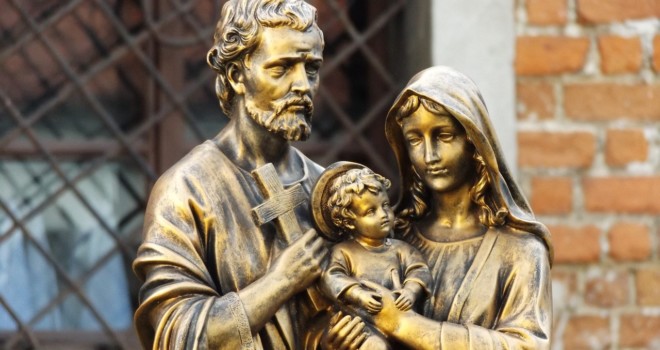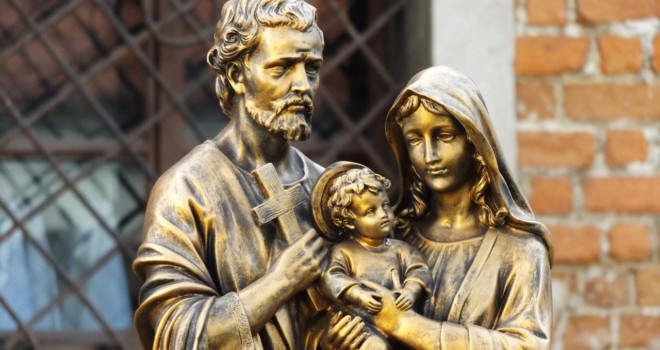
 Have you heard the joke about the Holy Family?
Have you heard the joke about the Holy Family?
Poor Joseph. Whenever someone was at fault in the Holy Family, they always knew Joseph was the one to blame. (He was, after all, the only one who wasn’t without sin.)
Of course, in our ordinary families, we are all Joseph (but worse, because we likely aren’t saints, at least not yet). Nevertheless, there is something holy about the family unit, or else Jesus wouldn’t have chosen to spend most of his life living in a family.
For those of us who have experienced family life, we can’t deny that it does have great potential for saint making. I remember, prior to marriage, thinking that I wasn’t doing too bad in terms of trying to be holy. Then I became a wife. Then I became a mother. Suddenly, I realized I was a long way from sainthood.
In fact, without God’s grace, sainthood wouldn’t even be a possibility. Being a wife and mother (wife to a kind and gentle man from an equally sweet family, and mom to the cutest kids I could ever ask for) has shown me how unworthy I am of so great a gift as my vocation. Yet, despite my unworthiness, God has giving me this little family. And I am so grateful for them.
But no family is perfect, not even the Holy Family (ahem, St. Joseph, ahem). In the case of imperfections, dysfunction, or even history of abuse…how can we seek holiness in our families?
The Model of the Holy Family
Looking at the Holy Family shows us what family is meant to be. A healthy family should consist of people who are trying to love each other, and mutually grow in holiness. In the case of parents, there should be a selfless pouring out for the children (if there are any), and unconditional love (offered without demands for reciprocation and not withheld for any reason). This kind of love stirs children to honor and respect their parents. Parental love, when healthy and holy, is meant to point to the love of the heavenly Father. The spouses in a family are meant to lay down their lives for each other, wholly and mutually, imaging the love of Christ and His Church.
Of course, the Holy Family depicts all of this beautifully. Mary and Joseph sacrifice all their previous plans and expectations in order to welcome and raise Jesus, and help each other grow in holiness. Again and again, they find themselves inconvenienced (labor and delivery in a stable), fleeing for their lives (flight to Egypt), or frantic with worry (finding in the Temple). Yet, not once do they try to make Jesus feel guilty for his needs or withhold their love for him. (There is no verse in which Mary says, “Do you know what I went through to give birth to you? I had to ride a donkey to Egypt when I was postpartum!”)
In fact, there are times that Jesus throws up boundaries (i.e. asserting his need to follow the will of the Father, like in the Finding in the Temple and in his public ministry), and Mary and Joseph always respect that (even when they don’t fully understand it). They love him, and they know that he ultimately belongs to the Father, not them.
Likewise, Jesus chooses to be obedient to them. He honors them and loves them, but that honoring doesn’t always equal doing what they want, especially not when it conflicts with the Father’s will. (Although, Mary and Joseph didn’t oppose the Father’s will, just didn’t always understand all the details right away.) He obeys them as a child and loves them as an adult.
The Holy Family vs. An Ordinary Family
How does this mirror life in an ordinary family, trying to be holy?
No family is perfect, and no parents will be able to be as perfectly selfless as Mary and Joseph — but good and healthy parents will try to sacrifice for the well-being of their children. They will try to always love unconditionally, not using conditional love to manipulate their children, but rather showing their children love no matter what. They expect obedience from young children and respect from older children, but they will also love their children in a way that respects their own little personhood. They will acknowledge that God’s will for their children come before their own plans, keeping in mind that their children ultimately belong to Him.
Likewise, children will strive to obey the just expectations of their parents. They will try to love and honor their parents, while still putting God’s plan for their lives first.
In an ordinary family, the members of the family may get frustrated with each other. They may occasionally argue. But ultimately, the members of an ordinary family will strive to love each other and support each other. They will try to humbly serve each other, and be Christ for each other. They won’t do it perfectly, but they will try to be holy. When they fail, they will be open to criticism and humbly turn to the Sacraments for the grace to do better.
Despite their failures and imperfections, there is hope that this kind of family can be like the Holy Family.
The Holy Family vs. a Dysfunctional or Abusive Family
Unfortunately, many families are dysfunctional (i.e. behave in a way that is unhealthy and/or unproductive) or abusive (physical/sexual/spiritual/emotional or some combination thereof). In the midst of the Christmas season, many people find themselves either faced with memories of dysfunction and abuse or faced with navigating relationships with unhealthy people.
Yet, God calls these families to holiness, too.
Often, the advice given to those in dysfunctional or abusive families is spiritually abusive. Sometimes, parents or older relatives will chide their children to “honor your parents,” trying to make a child or adult child feel unhealthy guilt and submit to abuse. Some people experience this from a spouse or a sibling.
Sometimes, avoiding these unhealthy or abusive individuals is impossible, but it may be possible to limit your contact with them. Other times, a family may be so toxic or abusive that you may need to no longer be in contact with them.
What should you do if you are in a family like this, and you still want to be holy?
You can still honor and respect your parents, even if it might be from a distance. Sometimes, no longer allowing a parent, grandparent, etc. to abuse you is the closest you can get to honoring them (by no longer allowing them to be in a situation in which they may abuse). The same is true for abusive relationships with siblings or other family members. Sometimes, the best way to love is from a distance. Sometimes, the loving thing is no longer allowing the cycle of dysfunction or abuse to continue.
This is, of course, a heartbreaking situation. Yet, praying for dysfunctional or abusive family members (and establishing whatever boundaries are necessary to keep yourself safe) is loving them. Praying for their healing (as many people who are dysfunctional or abusive are also mentally unhealthy or were victims of abuse themselves) may even help them to one day get to heaven.
This kind of prayer and love is honoring (no matter what an abusive family member might tell you), and…you guessed it. There is even hope for a family like this to be like the Holy Family. We never know how God will work in the hearts of others, and praying for and loving family members can help them get to heaven; even if they aren’t safe or healthy to have in your own life right now.
All Families Are Called to Holiness
Holiness is not about “keeping up appearances.” It isn’t about feeling happy and having rosy memories. It is about love — the kind of love that is willing to suffer or die for the beloved.
Part of our families being holy means that they need to try and be healthy. That doesn’t mean that our families need to be perfect.
We will all fail in ordinary, daily ways, but it is important that we truly desire the good of the other person. It is essential that we treat the other members of our family with respect. And if anyone in our family doesn’t treat the rest of the family that way? It is important to establish healthy boundaries, and seek healing (whether for ourselves or for a difficult relationship). Mental health matters. Relationship health matters. Part of our families being holy is seeking out the resources we need to have healthy relationships.
Regardless of your family’s situation, there is hope for you. You are called to holiness. Holiness will look very different, depending on the health of the family dynamics, but regardless, all families are called to holiness. The most powerful thing you can do is to daily entrust the health, healing (if necessary), and holiness of your family to God.
God willing, we’ll all be saints like Joseph, too.













